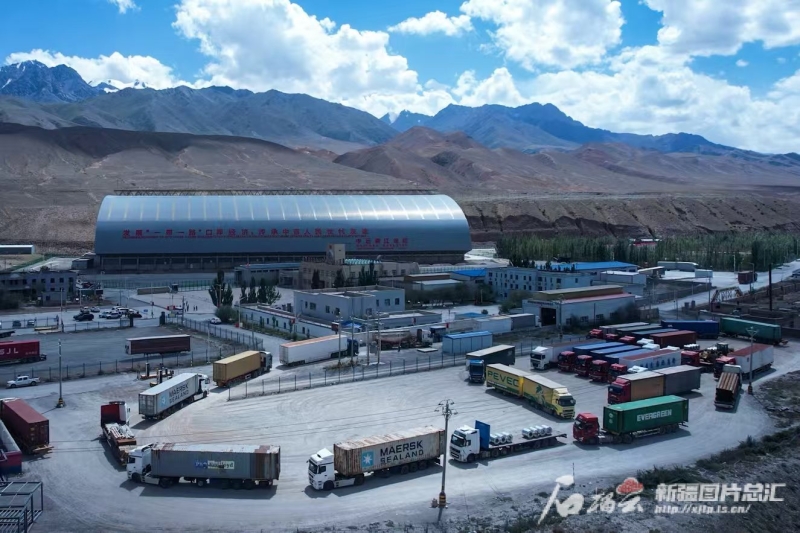Shiliuyun-Xinjiang Daily (Reporter Song Weiguo) news: On August 28, 2024, Yang Ping, a driver from Yibin City of southwest China's Sichuan Province, completed the exit-entry formalities at the Irkeshtam Port and drove towards Kyrgyzstan. The vehicle he drove marks the 100,000 exit-entry vehicle at the Irkeshtam Port this year.
"I've been driving transport vehicles at this port since 2023, and every time I pass through our border inspection station, I can feel the convenience and efficiency here. Both me and my cargo can clear customs quickly, greatly saving time and costs," said Yang Ping.
According to statistics from the Irkeshtam Exit-Entry Frontier Inspection Station of the Xinjiang Exit-Entry Frontier Inspection General Station, as of August 28 this year, the Irkeshtam Port has inspected and released 100,000 vehicles and 107,000 people for exit and entry, surpassing the targets of "100,000+" two months and three months earlier, respectively, compared to last year.

File photo shows the Irkeshtam Port in Kizilsu Kirgiz Autonomous Prefecture, northwest China's Xinjiang Uygur Autonomous Region. (Photo by Lei Minghui)
Located in Simuhana Township, Wuqia County, Kizilsu Kirgiz Autonomous Prefecture, and adjacent to Kyrgyzstan, the Irkeshtam Port sits at the intersection of the Tianshan and Kunlun mountain ranges, serving as a vital gateway and crucial hub connecting the five Central Asian countries and radiating towards West Asia and Europe. The main export commodities through this port include clothing, shoes, hats, daily necessities, automobiles and parts, machinery and equipment, and household appliances, while imports mainly consist of dried fruits, ores, coal, and other products. The immigration management police at the Irkeshtam Exit-Entry Frontier Inspection Station are stationed here year-round, tasked with conducting exit-entry frontier inspections, controls, and patrols at the port.
To ensure more efficient and convenient customs clearance for exit-entry personnel and vehicles, the Irkeshtam Exit-Entry Frontier Inspection Station has implemented a "ready-to-inspect" service available 14 hours a day, 7 days a week, effectively "paving the way" and "building bridges" to facilitate trade between Central Asian countries and China.

File photo shows a police inspects vehicles at the Irkeshtam Exit-Entry Frontier Inspection Station in Kizilsu Kirgiz Autonomous Prefecture, northwest China's Xinjiang Uygur Autonomous Region. (Photo by Lei Minghui)
"This year, in the face of a continuous surge in passenger and cargo traffic at the port, we have scientifically adjusted our operational deployment, innovated customs clearance measures, implemented a '7-day-a-week, 14-hour-a-day' operational model, and established mechanisms such as dynamic police reinforcement. With the strengthening of organizational construction as the core, we have implemented a five-in-one model, with the Party group serving as the center to drive improvements in operational capabilities, thereby more effectively ensuring the smooth progress of all operations," said Yang Lei, the captain of the first squad on duty at the Irkeshtam Exit-Entry Frontier Inspection Station.
On July 18 this year, the Irkeshtam Exit-Entry Frontier Inspection Station further introduced convenient measures such as centralized reporting, appointment-based customs clearance, extended customs hours, and online processing.
"Now we can handle related business right from our phones in the restroom. If we encounter any difficulties, we can easily find someone to help us on the spot. It's extremely convenient," said Maimait Shawuti, a driver who frequently travels between China and Kyrgyzstan.
(A written permission shall be obtained for reprinting, excerpting, copying and mirroring of the contents published on this website. Unauthorized aforementioned act shall be deemed an infringement, of which the actor shall be held accountable under the law.)









